Standing up to a storm
Four veterinarians share stories of facing big change in their lives: divorce, death, illness, work stress. Find out how they braced themselves against harsh conditions in their personal lives.

The breeze gets stiffer, you get cold and shivery, you wonder if you'll make it. A storm is coming. These colleagues have been through changes, big and small. You can do it. (Shutterstock.com)Life sometimes gets the best of us. No matter how smoothly the veterinary clinic is running, personal issues can stop you in your tracks. Whether it's something as exciting as getting married and having children, or as devastating as a serious illness or a death in the family, stress has a way of creeping in when you least expect it. Unfortunately, you can't push the pause button for your career while you sort out life.
We talked to four veterinarians who faced major life events about how they kept business going in the face of trials. Here's a peek into their lives before and after:
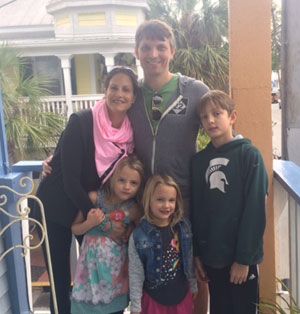
Andy Rollo, DVM, and family (Image courtesy Andy Rollo, DVM)Having children: Andy Rollo, DVM
Fresh out of veterinary school, Dr. Andy Rollo's schedule was wide open. The practice needed him to work a weekend? No problem! Someone needed him to cover an extra evening shift? Count him in! As the newbie at the practice, he was all in. Then, as young men often do, he got married and moved farther from his job, making him less available. Shortly after, Dr. Rollo and his wife welcomed a baby to their family. That's when the balancing act began.
“When I found out we were expecting a baby the first time, I changed jobs to be closer to home,” says Dr. Rollo, an associate at Madison Veterinary Hospital in Madison Heights, Michigan. “A set work schedule became much more appealing to me.”
His children are now 9, 7 and 4, and Dr. Rollo says he has learned to be more efficient with his time.
“Some of that [comes] with the territory of being out of school for 14 years now. Naturally, [I'm] more efficient,” he says. “But I've also better learned to budget my time. My family is a factor in how I schedule my days and how I communicate with clients.”
Where once Dr. Rollo would have given out his cell phone number to clients, he now guards clients' access to him a bit tighter.
“When my 2-year-old needs a diaper change, another kid is crying, and the third is pulling on my leg, I'm not going to be able to have a quality conversation with a client whose pet is doing poorly,” he says. “It's not fair to the client, nor can my kids understand that daddy needs to take an important phone call. So I tell my clients that when I'm in the office, I'll give them my all. But when I'm off work, that time is for my family.”
“It's all a balancing act. I know I can't be there for all of it but I do what I can.”
Dr. Rollo's wife is a part-time teacher. For a while, he took the morning shift two days a week on a day he was off or went in late to pitch in with getting kids off to school. His shift has now changed, and he isn't as available in the mornings, making those days harder on his wife. He also works one late shift per week, meaning he misses out on time with his kids home on those evenings. However, other days he's free to coach his kids' T-ball and baseball teams after school and attend most of their games.
“It's all a balancing act,” he says. “I know I can't be there for all of it but I do what I can.”
His biggest advice is one you've heard a million times: communicate.
“Communication is key: communication with my spouse, my kids and the people at my job,” says Dr. Rollo. “You don't have to be just a parent or just a veterinarian. With communication and advance planning, you can make it to most events. You'll have to make sacrifices at some point on both sides, but if you just talk, you can work most things out. Our profession has a lot of workable hours, and you can usually find something that fits your schedule, whether you're a parent or not.”
That goes for his technicians as well. As a doctor, he often has more control of his schedule. But he says he talks with his technicians about their lives and schedule, too.
“I tell them, if you have something going on that you need time off for, just tell me,” he says. “One time I had a surgery that went long, and my technician didn't tell me she had play tickets, and she missed the event. I didn't know about it until afterward. Had she told me ahead of time, we could have called someone in or made other arrangements. If it's important to you, we will do what we can to make it happen.”

Editors' note: For more veterinarians' stories, keep reading. And click here for more content from the dvm360 Leadership Challenge: Vet Life Transitions.
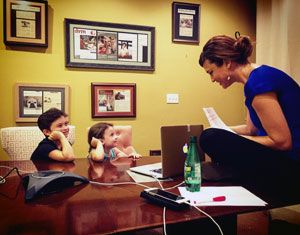
"The kids are really involved with me on a daily basis," says Dani McVety, DVM. "They've lectured with me, done videos with me, and so much more." (Image courtesy Dani McVety, DVM)Divorce: Dani McVety, DVM
As if starting veterinary school (and continuing it, and finishing it) isn't stressful enough, Dr. Dani McVety got married just before school started. At 22 years old, she and her husband, a law school student, started their life together. They had a child during this time and moved back to their home town after graduation. She started a business-Lap of Love Veterinary Hospice in Tampa, Florida-that flourished at a surprising rate, with no signs of stopping. They added another child to their family.
“Life was wonderful all through school and up to that point,” says Dr. McVety. “It was interesting, though, to watch the dynamics shift and change as my then-husband started his job as an attorney and my business grew. That's when we found our dreams were growing apart.”
They weren't happy, and something needed to change: “I had a passion for my children and for my work, and that's what kept me going.”
No matter how much guilt and pain she experienced, she said she knew it was time to move on to thrive professionally and personally. She wanted to show her children to dream and live big, and not let anyone keep you from your passions.
“My kids' preschool teacher at the time told me that when parents divorce, they often continue to be miserable,” she said. “She said, ‘If you're going to divorce, be happy, for heaven's sake. Don't continue to be miserable.' That spoke to me, because I was going through the pain of divorce because I believe there is something really good on the other side.”
Three-and-a-half years later, Dr. McVety says she wouldn't change her decision for the world. Her business is still booming, with more than 116 doctors on staff around the country, and passion on fire for what she does. She's now married to a man whose dreams align with hers. But that doesn't mean it was always easy. There were times she found herself in the fetal positon in the corner of her office crying.
“I had to allow those moments for myself,” she says. “But then I would walk into a home for end-of-life care for a pet, and it would always center me. I left feeling so on purpose for my life, and it reminded me what I am here on earth to do.”
Through it all, Dr. McVety says the experience of divorce has taught her more about having difficult conversations with dignity and strength. She has learned to disagree with people while still showing love.
“I chose this path,” she says. “I know a lot of life stressors people have no control over, but I chose to divorce. I experienced a lot of guilt and shame, but I made the choice to be happy, and to be kind, no matter what.”
She also emphasizes that taking steps to change your situation applies not only to a marriage, but to a job, as well: “If you don't like your clinic, then do something about it! Make suggestions for improvement, make changes, and move on, if all else fails. You are responsible for choosing to be happy.”
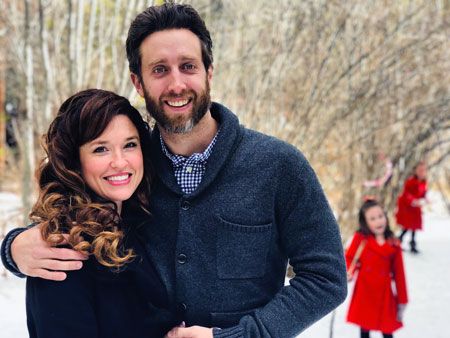
"My new husband, Dominic, has fit into our family so perfectly. Nothing was missing with the three of us (kids and I), but he's added an energy that has, for some unknown reason, made our lives more perfect than they already were." (Image courtesy Dani McVety, DVM)
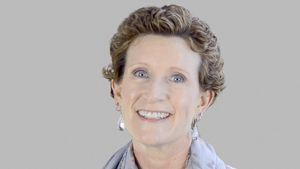
Karen Bradley, DVMSerious illness: Karen Bradley, DVM
One month late for her annual mammogram in June 2016, Dr. Karen Bradley found a lump in her breast.
“It wasn't at the best time, but when will you get a cancer diagnosis at the right time?” she asks. As one of three owners in the midst of moving their practice into a newer, bigger facility, and buying out one of the partners, she instead found herself dealing with stage IIIA breast cancer that had spread to her lymph nodes.
Dr. Bradley underwent chemotherapy, surgery and radiation. She now is on an experimental drug and feeling well most of the time. Dr. Bradley took time off for her surgeries, and a couple of days off to recover after each chemotherapy or radiation treatment.
“Thank goodness for supportive business partners, my manager and staff members, who all pitched in,” says Dr. Bradley. “My team never made me feel like I couldn't do it.”
As a practice owner, Dr. Bradley helped craft a culture that allows for staff members to take the time they need for serious issues without fear of losing income. Several years before Dr. Bradley's cancer, her co-owner's son endured treatments for leukemia. Her partner was out of the office a lot; during that year, the rest of the staff took over much of her workload.
“We didn't touch her salary, no matter how much she was out,” says Dr. Bradley. “She did what she needed for her son during a very intense year. What goes around comes around, because while I was sick, they did the same for me. No one cut my salary or said I wasn't pulling my weight. They just took care of me.”
“Now when I treat a sick pet, I can assure the pet owner that the pet won't feel like chasing a tennis ball five days after chemotherapy, that it's OK for the dog to lay there like a log,” she says. “I know from personal experience.”
Dr. Bradley lived out her cancer treatment the way she lives her life: transparently. She told her clients what was happening. It was clear something was up when she wasn't in the office as often, and when she was, she was bald. She says being upfront about her illness has made her a better doctor.
“Now when I treat a sick pet, I can assure the pet owner that the pet won't feel like chasing a tennis ball five days after chemotherapy, that it's OK for the dog to lay there like a log,” she says. “I know from personal experience.”
Talking about her illness also led to some clients sharing their own personal woes. Dr. Bradley says her experience has helped her know how hard it is for others.
“I can assure my clients that the best thing I can do for them is to work to make their pets healthy and strong to support them,” she says.
Astonishingly, just after Dr. Bradley's diagnosis, one of her technicians got her own breast cancer diagnosis. Thankfully, she caught it early and it hadn't spread to her lymph nodes, as Dr. Bradley's had.
“Being open and transparent about an illness helps me to encourage others to get themselves checked,” she says. “My technician is doing very well now, and she was so much bolder than me about going bald. She looks gorgeous!”
Death of a spouse: Jed Rogers, DVM
Dr. Jed Rogers' world was rocked in 2002 when his wife, Maia, was diagnosed with breast cancer. She underwent a series of treatments, but the cancer returned in 2007. During this time, Dr. Rogers stopped practicing medicine and focused instead on helping run a group of hospitals he co-owned in Colorado. The couple's children were 5 and 3 years old at the time Maia was diagnosed. His priority was balancing the needs of his kids, his wife, his business and his own health.
“It was overwhelming to me, quite a juggling act,” Dr. Rogers says.
In 2010 Dr. Rogers sold that group of hospitals, in big part because of his wife's illness and his desire to be available for her and their children. In 2013, Maia succumbed to the illness, leaving Dr. Rogers behind with 16- and 14-year-old children. He stayed in Denver until the kids graduated high school to keep them in their environment and as stable as possible.
During her long illness, Dr. Rogers and Maia had put plans in place for when she had to be admitted to the hospital or was home sick to minimize disruptions that come with the unpredictability of a chronic illness. Having a plan in place, with significant support from friends and family, eased some of the logistical difficulties.
“When she passed away it was definitely more challenging,” says Dr. Rogers. “I realized a lot of stuff that she was doing, and with her not there it was quite an adjustment.”
Dr. Rogers had to become more adaptable in terms of when he worked. He says their kids were forced to assume more responsibility at an earlier age than many of their friends.
“I tried to organize my work and travel schedule so I could prioritize them, and sometimes I did well at that and sometimes I didn't,” he says. “I think I missed some things during that time because I failed to plan well or communicate. That was frustrating, but I've slowly learned to do better.”
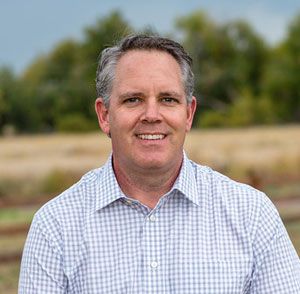
Jed Rogers, DVM (Image courtesy Jed Rogers, DVM)He has also learned that there is no such thing as work time and home time. Before, he was able to compartmentalize his work and family time, but now he says it's all one big chunk of time. He plugs meetings in between kids' events, often jumping from role to role on a moment's notice.
“There are no work hours and family hours and personal hours now,” he says. “I just parcel out chunks of time here and there.”
Dr. Rogers says, as far as work is concerned, his wife's illness and death forced him to be more flexible and more efficient. He says that's something all doctors evolve in over the years, but his changes became absolutely essential to his survival.
"We all put artificial pressure on ourselves to do a thing by a certain time. When you go through a major transition like this, those rules don't apply. You'll just get overwhelmed if you try. Avoid the pressure of timelines, and just continue your process."
“My biggest piece of advice, no matter what life stress you're facing: Don't get hung up on timelines,” he says. “I think we all put artificial pressure on ourselves to do a thing by a certain time. When you go through a major transition like this, those rules don't apply. You'll just get overwhelmed if you try. Avoid the pressure of timelines, and just continue your process.”
Dr. Rogers is now remarried, and his children are 18 and 20 years old. He co-owns and is CEO of Firehouse Animal Health Centers in Austin, Texas.
4 tips for life storms
Change is coming-or it's here. Here are four ways to weather-proof your thinking for the storm.
No. 1: Accept help ... really
Veterinarians are caregivers by nature, but asking for and accepting help from others rarely comes naturally. Dr. Jed Rogers, whose wife passed away, and Dr. Karen Bradley, a breast cancer survivor, both say letting others shoulder the load is vital to surviving a difficult time.
“Veterinarians, especially practice owners, often don't ask for help, and even turn it down when offered,” says Dr. Bradley. “But when you go through something life changing, it's time to turn that off and accept the meals people offer, be grateful. If they offer to take a task off your shoulders, let them. People want to help.”
Dr. Bradley made a list of things she needed help with and kept it with her at all times. Then, when people said, “Let me know how I can help,” she was ready with a concrete suggestion, from helping drive her daughter to dance or mowing the lawn.
Elizabeth Strand, LCSW, a therapist and social worker who works with veterinary students at the University of Tennessee at Knowville, says this skill is absolutely crucial to staying afloat when you're feeling like you're lost at sea.
“Being able to prioritize your strongest need and asking for and allowing others to help you is an extremely important skill,” says Strand. “I've never met a profession that is more willing to help others. But veterinarians often think they need to have it all together, with an unreasonable perfectionistic side. If you won't ask for and accept help from others, you're preventing [others you work with] from doing what's in their nature.”
Strand says people benefit from altruism. Allowing others to help gives them good feelings while it takes a burden off of you. She also emphasizes to veterinary students and professionals that asking for help is temporary-you won't always be in this position, and you'll be able to return the favor soon.
Top 10 life stressors
According to the Holmes and Rahe Stress Scale, these are the most stressful events you'll face in life, in order:
1. Death of a spouse
2. Divorce
3. Marital separation
4. Imprisonment
5. Death of a close family member
6. Personal injury or illness
7. Marriage
8. Dismissal from work
9. Marital reconciliation
10. Retirement
Source: The social readjustment rating scale, Holmes, T. H. and Rahe, R. H. 1967, Journal of Psychosomatic research, 11(2), 213-21.
No. 2: Allow yourself to feel
All life events, from a serious illness to your daughter getting married, are forms of stress. When a body goes through stress the emotional brain is involved.
“The biggest thing that causes people to get stuck or not be able to move through these life stressors well is neglecting the natural normal feelings that arise,” says Strand. “When I'm counseling someone, I'll ask how they feel about something. They start giving me thoughts on what they could have done better, whose fault it was, what they need to do next. But that isn't a feeling. Everyone needs to slow down and allow themselves to feel an emotion. Put it into words.”
For example, if a mom is rushing around to help her daughter get ready for a wedding and starts feeling stress, she needs to stop and identify how she feels about her daughter getting married.
“Once she can say that she feels sad about her daughter growing up, she can have a good cry over it, talk it out, then move on and get back to getting things done,” says Strand. “The act of identifying the feeling is freeing. When you stop allowing yourself to feel, the stress can control your life.”
No. 3: Practice self-care
Taking care of yourself involves something called the “Healthy Mind Platter,” an idea established by David Rock, MD, and Daniel Siegel, MD. The idea is that you serve up a healthy dose of self-care regularly, including seven key elements:
- Focus time for tasks
- Play time
- Time to connect with others
- Physical activity
- Time for mediation and thought
- Sleep
- Unstructured down time
When counseling clients, Strand asks them what self-care they were doing before a crisis hit and helps guide them back to it during times of stress.
“Ask yourself, did I already do these things before? If so, let's choose some to keep doing,” she says. “If a person wasn't doing these things before, I help them get started, usually with physical activity. Taking care of yourself will help your brain function and handle the stress.”
4. Have compassion for yourself
If you wouldn't say it to a friend, don't say it to yourself, admonishes Strand. That means, don't be too hard on yourself, and remember that your situation isn't just happening to you. “Every human around you is going to have similar times of difficulty in life,” she says. “Realize that you're not an isolated event and that you will get through this. It's your turn for a challenge, and you're not a failure for experiencing it. Take care of yourself, ask for help, and be kind to yourself.”
Sarah A. Moser is a freelance writer in Lenexa, Kan.